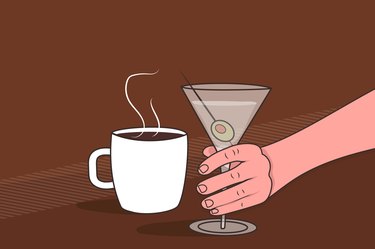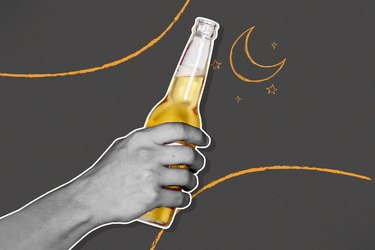
You planned to meet your friends for a cocktail or beer after work. Next thing you know, you're on your second or third drink and, even though you know you'll be feeling it in the morning, you can't seem to get yourself to go home. What gives?
Some people have a harder time stopping at one drink than others. "It really depends on the person as well as who they're around. But it's common, and often instead of happy hour, it can turn into happy hours," says Lee Phillips, EdD, LCSW, a Washington, D.C.-based psychotherapist specializing in substance abuse.
Video of the Day
Video of the Day
Not being able to resist another drink doesn't necessarily mean you have an alcohol use problem. But overdoing it can leave you feeling lousy and have long-term consequences for your health.
So if you plan to stop at one drink, it's important to be able to actually follow through. Here's why that can be hard and what you can do to up your odds for success.
Why It's So Hard to Stop Drinking Once You Start
Alcohol has a direct effect on your brain, but oftentimes, there's a strong social component involved too. Together, the two can create a perfect storm where it becomes difficult to say no to a second or third drink.
1. Alcohol Affects Your Brain Function
Alcohol is a relaxant that interferes with the brain's communication pathways. In addition to slowing down your reaction time and making it harder to balance, it also disrupts your ability to make sound decisions, according to the National Institute on Alcohol Abuse and Alcoholism (NIAAA). It can also make you more impulsive.
As a result, you end up prioritizing your current needs and wants over your future ones, because at the moment, the current ones become your top priority. And that can make it really easy to order another round.
Even though you know you have to get up early to prep for a big presentation tomorrow or are trying to drink less in an effort to reach a healthier weight, to your booze-fueled brain, keeping the fun going right now seems way more important.
There's also the fact that alcohol's relaxing effects just make you feel good. If your days are super stressful or you struggle with feelings of anxiety or depression, getting a buzz can feel like getting a break, Phillips points out. And sometimes you might want that break to last a little longer.
Alcohol doesn't just affect your internal decision-making process. It also affects the way decisions are made among you and the other people you're drinking with, per November 2021 findings in Neuropsychopharmacology.
If you and your friends are having a great time, you might be more prone to collectively decide to order a second pitcher of margaritas for everyone to share.
And even if you kind of do want to stop at just one drink, if your friends are up for another, there's a pretty good chance they'll want you to stick around. "Your friends might say, 'Just one more! We're having a great time!'" Phillips says. "And who doesn't want to have fun? You don't want to be the one to say 'No, it's time to go home.'"
How to Stop After One Drink
Sticking to your one drink limit can be hard, but it's doable. You'll have the most success when you take a multi-pronged approach where you find ways to hold yourself accountable while strategizing ways to say no, says Phillips.
Here's how to moderate your drinking:
- Make wellness a priority. Sometimes it's easier to follow a one-drink rule when it's part of a bigger health picture. Maybe in addition to only having one drink when you go out, you're also planning to exercise most days of the week, have salads for lunch and get eight hours of sleep at night. When you're thinking about your alcohol consumption in the context of your overall wellness mission, the decision to have or skip that second drink becomes more consequential.
- Set boundaries and stick with them. When you get together with friends for a drink, be up front about the fact that you're only going to have one. That might head off those pleas for a second round. But if not, be prepared to stand firm on your choice. You can say something like: "I know you're having fun and I'm having fun too. But I planned to have just one drink and I need to go home." If they're a true friend, they'll get it, Phillips says.
- Be nice to yourself. Just like everybody overdoes it with food sometimes, everybody sometimes drinks a little more than they planned to. That doesn't make you a bad person or mean you have a drinking problem, says Phillips. Just make sure you're able to get back on track next time you imbibe.
When to Get Help for Your Drinking
Occasionally having a second or third drink and waking up with a headache the next day probably isn't a big deal. But if your drinking is making it harder to fulfill your responsibilities at school or work, is affecting your relationships or has led to legal problems like getting tickets for drunk driving, you may have an alcohol use disorder, according to the Centers for Disease Control and Prevention (CDC).
"Those are all signs that people need help," Philips says.
Start by talking about your drinking with your primary care doctor. Together you can determine the best way to reduce your alcohol intake and protect your health.
Is this an emergency? If you are experiencing serious medical symptoms, please see the National Library of Medicine’s list of signs you need emergency medical attention or call 911.


